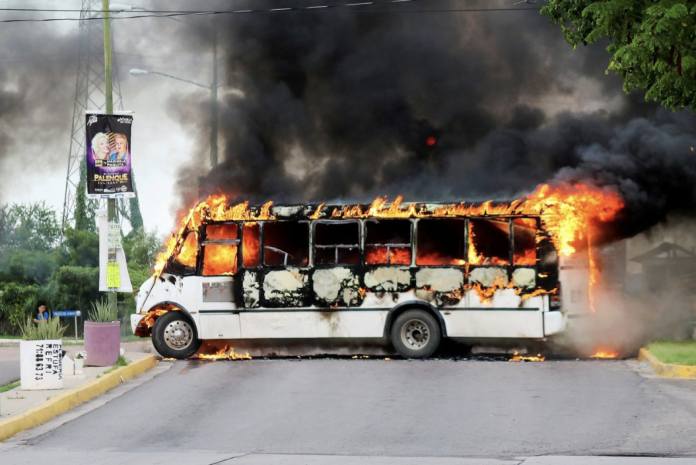William P. Barr,
America can no longer tolerate narco-terrorist cartels. Operating from havens in Mexico, their production of deadly drugs on an industrial scale is flooding our country with this poison. The time is long past to deal with this outrage decisively. Reps. Dan Crenshaw (R., Texas) and Michael Waltz (R., Fla.) have proposed a joint resolution giving the president authority to use the U.S. military against these cartels in Mexico. This is a necessary step and puts the focus where it must be.
Overdose deaths every year—more than 100,000—exceed the number of Americans killed in action during the bloodiest year of World War II. But the devastation from drug abuse goes much deeper. A 2017 analysis, accounting for the costs of healthcare, criminal justice, lost productivity and social and family services, estimated that the total cost of America’s drug epidemic was more than $1 trillion annually, or 5% of gross domestic product. Given the explosion in illicit drug deaths since then, this estimate now seems conservative.
Almost all illicit drugs coming into the U.S. are controlled by the Mexican cartels, principally those based in the states of Sinaloa and Jalisco. These paramilitary organizations use bribery and terror tactics to entrench themselves as essentially states within the state, controlling large areas of Mexico. They have become so powerful they can confront the Mexican government with the narcoterrorists’ stark choice: “plata o plomo”—silver or lead. If they can’t buy off officials, they try to cow them with threats of violence.
An antidrug strategy that leaves the drug supply chain untouched will have minimal impact. Real progress requires aggressively attacking the drug supply at its source. The head of the snake is in Mexico, and that is where the main thrust of our efforts must be directed. Experience in the early 1990s proved this, when the U.S. and Colombian governments joined in an all-out attack on the Medellín and Cali cartels inside Colombia, successfully eliminating them. Unfortunately, in the mid-1990s, we pulled back from this kind of extraterritorial engagement.
Mexican cartels have flourished because Mexican administrations haven’t been willing to take them on. The exception was President Felipe Calderón (2006-12) who wanted to go full bore against the cartels, but American priorities were elsewhere at the time. Today, the cartels’ chief enabler is President Andrés Manuel López Obrador, known as AMLO. When he came to power at the end of 2018, he announced the switch to a policy of “hugs, not bullets” and shut down counternarcotics cooperation with the U.S. Under strong pressure from President Trump, he occasionally engaged in a high-profile operation to create the illusion of cooperation, but these were smoke screens. In reality, AMLO is unwilling to take action that would seriously challenge the cartels. He shields them by consistently invoking Mexico’s sovereignty to block the U.S. from taking effective action.
This posture should anger Americans. Under international law, a government has a duty to ensure that lawless groups don’t use its territory to carry out predations against its neighbors. If a government is unwilling or unable to do so, then the country being harmed has the right to take direct action to eliminate the threat, with or without the host country’s approval.
Even if AMLO were willing to move against the cartels, Mexico can’t do the job itself. Its criminal-justice system is dysfunctional: 95% of all violent crimes go unpunished. Pervasive corruption at every level of Mexico’s government makes it almost impossible to mount effective law-enforcement or military operations without the cartels being tipped off in advance. The big cartels have become potent paramilitary forces, with heavily armed mobile units able to stand their ground against the Mexican military.
In October 2019, when Mexican troops went into Sinaloa and arrested El Chapo’s son, they were surrounded by 700 cartel paramilitary fighters with armored cars, rocket launchers and heavy machine guns, and the military was forced to release its prisoner. This past January, it repeated the operation with 4,000 troops, supported by aircraft. As a former Mexican security official complained, the military simply withdrew after capturing El Chapo’s son, leaving the cartel army intact and free to rampage around the state.
What will it take to defeat the Mexican cartels? First, a far more aggressive American effort inside Mexico than ever before, including a significant U.S. law-enforcement and intelligence presence, as well as select military capabilities. Optimally, the Mexican government will support and participate in this effort, and it is likely to do so once they understand that the U.S. is committed to do whatever is necessary to cripple the cartels, whether or not the Mexican government participates.
Second, the danger cartels pose to the U.S. requires that we confront them primarily as national-security threats, not a law-enforcement matter. These narco-terrorist groups are more like ISIS than like the American mafia. Case-by-case prosecution of individuals can be a part of an overall effort, but the only way to defeat them is to use every tool at our disposal inside Mexico. Merely designating the cartels as terrorist groups will do nothing by itself. The real question is whether we are willing to go after them as we would a terrorist group.
The goal isn’t a perfect Mexico. Our objective must be to degrade the cartels to the point that Mexican governments can muster the will and the wherewithal to keep them in check. We can’t get caught in the trap of “nation building.” Attempts to reform Mexico’s institutions and surmount its pervasive corruption will get nowhere as long as cartels hold the dominance they do.
The cartels have Mexico in a python-like stranglehold. American leadership is needed to help Mexico break free. We can’t accept a failed narco-state on our border, providing sanctuary to narco-terrorist groups preying on the American people.
Mr. Barr is a distinguished fellow at the Hudson Institute and author of the memoir “One Damn Thing After Another.” He served as U.S. attorney general, 1991-93 and 2019-20.

